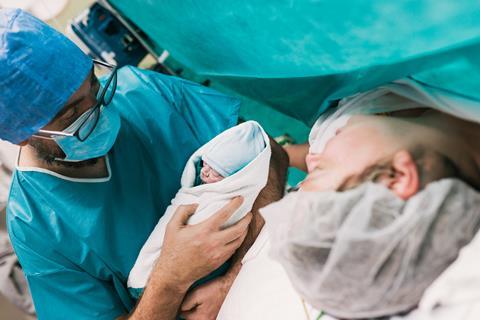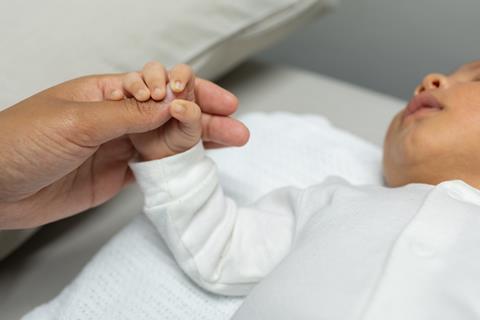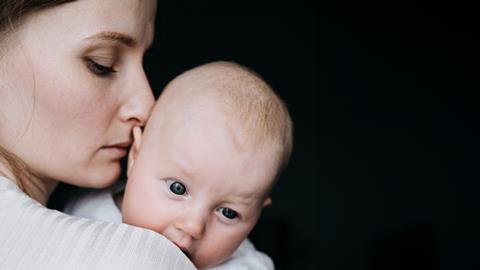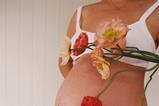Every week Dr Sarah-Louise Hurst, a perinatal clinical psychologist, listens to women who are struggling after difficult births and/or finding it hard to bond with their babies. She believes it is time such women are given space outside the therapy room to be heard, supported – and no longer shamed
“Why didn’t anyone tell me it would be like this?” she asked, her voice catching somewhere between exhaustion and quiet disbelief. We were sitting in my therapy room, her tears threatening to spill forth. The week before, another mother had said something strikingly similar: “I know I should be grateful, as we waited years for this baby. But no one told me it would be this hard.” As a perinatal clinical psychologist I’ve heard this refrain more times than I can count.
Many Christian women share birth stories where the rhetoric celebrates God’s goodness, or focuses on gratitude: “We were so blessed; everything went smoothly.” But there are other birth stories too, quieter, more complex, sometimes not spoken of so freely. Stories of fear, loss, trauma or unanswered prayers. Stories where God felt distant, or where faith was tested.
I’ve seen the healing that can come when we validate the complexity of birth and motherhood
We are going to take a closer look at some common birth stories I hear, in the hope that we can increasingly encourage and hold space for these experiences too, in our coffee shops, church meetings and teachings.

‘I didn’t get the birth I hoped for’
I often sit with women who feel conflicted about how hard birth and the early weeks of motherhood was for them. Somewhere along the way, many of us absorbed the belief that because birth is a natural, God-designed process, it should also be manageable. And for some, it is. But for others, the experience feels anything but.
The truth is, we are physically designed by God to birth, but not without struggle. Our bodies may be biologically equipped for labour, but birth also takes place in a fallen world marked by pain and broken systems. Genesis 3 reminds us that pain in childbirth is part of the human story post-Eden. That pain isn’t just physical; it can be emotional, psychological and even spiritual.
So many women experience a reality gap following birth. We feel the difference between the reality we wanted and the reality we have. Perhaps this is in relation to the vaginal birth we hoped for, versus the C-section we experienced. Or the healthy baby we imagined, versus the one in our arms. Even the little girl we dreamed of turning out to be our third little boy.
In my clinical work, I’ve seen the healing that can come when we validate the complexity of birth and motherhood. God is present in the ease and in the struggle. We are not less faithful, or less strong, when we say: “That wasn’t what I hoped for.” It simply means we’re human, and birth, like so much of motherhood, highlights our limits and invites dependence on grace.

‘When my baby was born, I didn’t feel a bond’
The idea of immediate bonding is a powerful cultural narrative, but it doesn’t reflect the wide range of real experiences mothers have. Attachment is not a single emotional moment; it’s a process, built through time, care and repetition. Our bond with our baby may not feel instant, because labour and birth can leave mothers in a state of shock or physical depletion – especially when unexpected interventions or exhaustion are involved.
For many women, the process of birthing can be overwhelming. We endure the smells, lights and pain for hours and then are handed our new baby and expect ourselves to ‘feel love’ instantly. However, when the process of birth triggers our ‘fight or flight’ nervous system response, attachment begins only when the mother’s body feels safe enough to shift from protection to connection. A history of trauma, whether from past births, childhood or other life events, can also influence how safe or emotionally available a mother feels in the early days, which can lead to the feeling of connection taking a little longer. Much like how our relationship with our partners took time to grow, the same is often true for our relationship with our new baby.
As a psychologist and someone who values the grace and patience God shows us, I believe the same applies in motherhood. Love doesn’t always appear as a rush. Sometimes it’s a slow unfolding and that’s no less sacred; nor does it have any bearing on our capacity as mothers.

‘I miss my old life from before I was a mum’
It is recognised that on the day a baby is born, a new identity for the woman is birthed too. Matrescence is the term given to this transformative identity shift of motherhood, which starts at pregnancy and continues throughout a mother’s life. It is as tangible an experience as adolescence, due to the enormous hormonal and bodily changes, shift in identity and emotional upheaval.
Particularly with our first baby, the transformation can be confusing and raw. When we were previously women who knew how to plan, prepare and achieve in life, the lack of control during those early months can be so unsettling. If we were the kind of women who thrived on predictability, a baby who takes little heed of our best-intended routines can feel overwhelming. This process results in many women missing their pre-parent life, or even regretting motherhood altogether.
My therapy room can feel akin to a confession booth when many mothers whisper: “I regret having a baby.” They find themselves grieving the life they left behind: the freedom and the clarity of who they were. This grief sits quietly alongside love for their child; both can be true at once.
I’ve seen the healing that can come when we validate the complexity of birth and motherhood
However, within many Christian communities, there can be an implicit bias toward emotional positivity. As our preaches and conversations prioritise gratitude, joy and faith, we can inadvertently discourage the expression of more complex, or ambivalent, feelings related to birth and motherhood.
Psychological research consistently shows that holding space for emotional paradox, such as simultaneous gratitude and grief, is essential for mental health, particularly during major life transitions. Scripture is full of paradox, like lament and praise, or doubt and trust, coexisting alongside each other. We can be grateful for our birth story and baby, and still grieve the birth experience we had. Honouring the full range of our emotions is not a threat to faith, but a natural part of human development and spiritual maturity.

‘I can’t stop thinking about what happened in the hospital’
For some mums, the untold part of their birth story is the trauma they experienced. Some say they felt out of control due to emergency procedures, or had a deep sense of not being heard or not feeling safe. For others, it may be that they, or their child, was at real risk or experienced harm.
Birth trauma can be defined as a significant emotional response to experiencing a labour or childbirth which felt shocking, frightening or dangerous. Re-experiencing is a common sign of birth trauma. As our brain tries to make sense of what happened to us, we can find ourselves lost in thinking about the event repeatedly, or trying to avoid reminders of it altogether. Many factors can result in us feeling a high level of anxiety. We may notice that certain things trigger us, such as hearing the baby cry, having the baby out of sight or being left alone. Research has shown that approximately 25,000-30,000 women a year in the UK develop PTSD following birth.
For some of these mums, time passing, being supported by loved ones and lots of rest can bring healing. However, mums may need extra support from a health professional if they find they are disconnected from their life or baby, if their sleep is disturbed by anxiety or nightmares, or if they are consistently tearful or numb.
For other parents, the trauma of birth is closely tied to what followed next. In the UK, one in seven babies require specialist neonatal care (according to The Royal College of Paediatrics and Child Health). Mums have told me that the sight of their tiny baby surrounded by wires in the neonatal intensive care unit (NICU), the invasive procedures and the lack of opportunity to hold and care for their baby can leave a lasting impact. We celebrate when these precious babies make it home, but it’s easy to underestimate the impact on mothers who spent the early days or weeks of their baby’s life in NICU. A survey by the charity Bliss found that one third of parents who had been on a neonatal unit described their mental health as ‘significantly worse’ afterwards.
For others, adjusting to birth is compounded by the reality that the birth caused lasting injuries. The Pelvic Obstetric and Gynaecological Physiotherapists say that 90 per cent of women giving birth vaginally will get a perineal tear, while three in 50 women tear to their back passage. Approximately 50 per cent of women experience some form of pelvic organ prolapse after pregnancy and birth. When among friends, women may mention not being able to jump on a trampoline, or leaking urine when they sneeze. However, few women share the degree to which their child’s birth has impacted their physical comfort, sex life or capacity to exercise.
These experiences remind us that birth can have lasting emotional and physical consequences that are too often overlooked. I wonder what it might be like to be intentional about asking after the physical and emotional health of women as we delight in their little ones. If we believe in a God who sees the whole person – body, mind and spirit – then our care of new mums must reflect that wholeness too.
Compassionate relationships are the answer
Motherhood is one of the most profound relational experiences we can have. In this tender season, God’s design for community becomes all the more essential. In both the joys and the struggles, his presence is so often felt through the voices, hands and prayers of others. May we be the ones who reach out, not only to the mothers who seem to be thriving, but also to those who feel unseen, unsure or on the margins. Isaiah 66:13 says: “As a mother comforts her child, so will I comfort you.” As we pour ourselves out in love for our little ones, may we also receive the comfort of God. And as we listen with compassion to the birth stories that are rarely shared, may we honour the sacredness of each one and make space for God’s healing and hope to be known.
Reflection
If you are a mother, consider: what did God reveal to you in your birth experience/s?
Whether a mother or not, how can you be part of creating space for all the stories of motherhood in your community?
Trusted resources
If you have experienced difficulties in early motherhood and have been impacted in any way by what you have read here, the following websites provide support and helpful advice.
Birth trauma
The Birth Trauma Organisation: birthtraumaassociation.org
Birth injuries
The Masic Foundation: masic.org.uk
Miracle Moon: miraclemoon.co.uk
Pregnancy loss/baby loss
Sands: sands.org.uk
Postnatal mental health struggles
Pandas: pandasfoundation.org.uk

































No comments yet